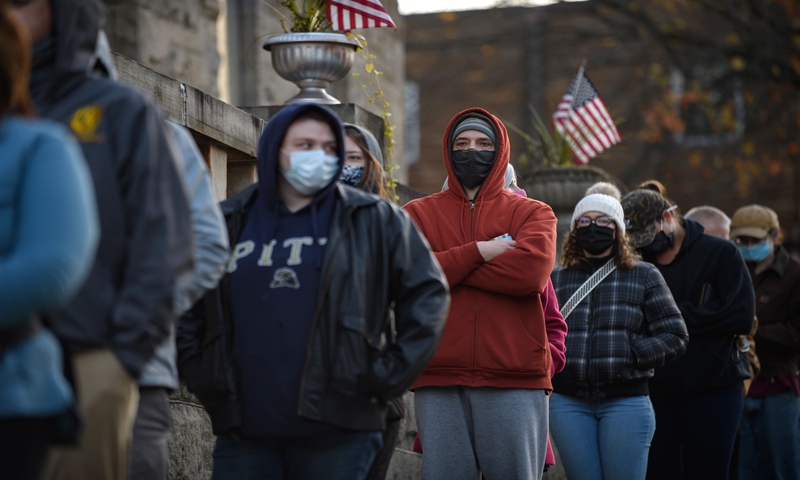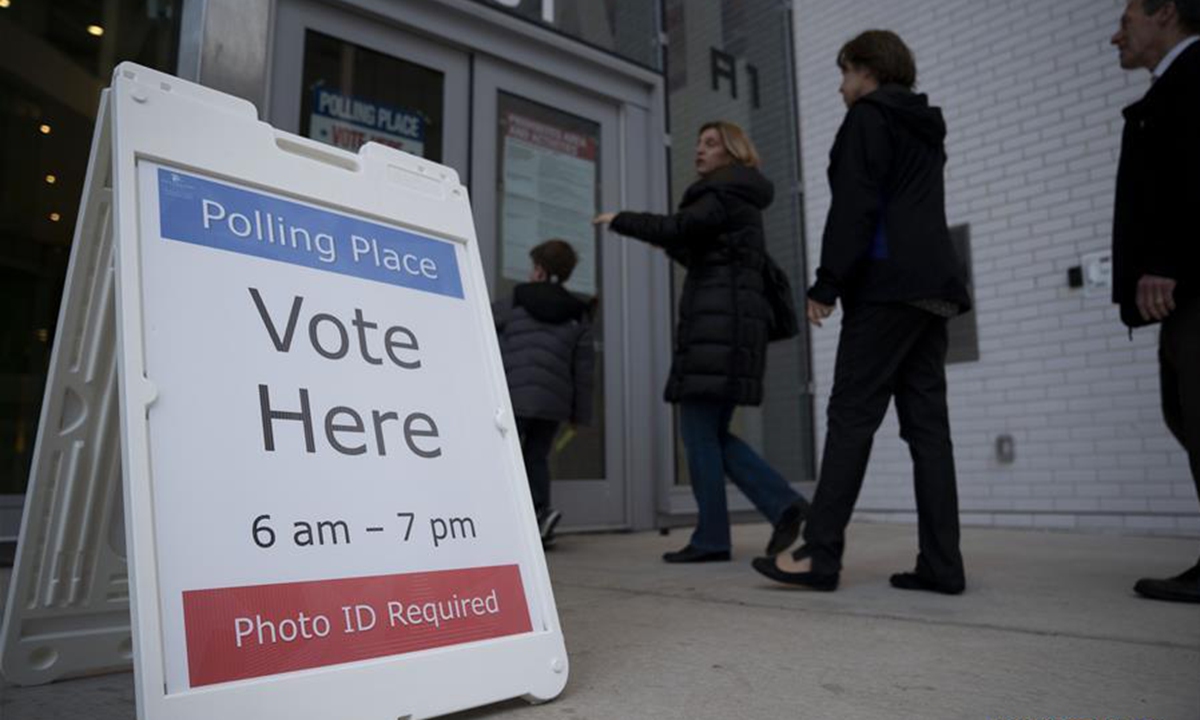Uncertainty lingers despite markets rally on Election day
By Li Xuanmin and Yang Sheng Source: Global Times Published: 2020/11/3 13:56:34
Major Chinese banks warn of fluctuations in intl financial market

Voters line up outside polling precincts in Pennsylvania on Tuesday, as Election Day voting began early Tuesday morning in many parts across the US. Photo: VCG
The final results of the US election are expected to come through in about 24 hours if it goes smoothly, but the uncertainty of the country's domestic situation has raised concerns among some Chinese experts and economists that a potential constitutional crisis could disrupt international relations and markets, with some of them calling the election a "black swan" event.
Despite an overall rally in the global stock market on Tuesday, the rising uncertainties associated with the outcome of the election could lead to short-term fluctuations in the financial market. Anticipating the potential risks, major banks in China have already issued rare statements warning investors of fluctuations in international financial markets during the elections.
The US Election Day voting is to be kicked off early Tuesday morning with first ballots cast in the northeastern state of New Hampshire.
According to the most polls conducted by US media, Democratic nominee Joe Biden holds a lead over President Donald Trump, with Biden getting 49-52 percent supports while Trump 38-46 percent.
Trump has said to the media that he will refuse to commit to a peaceful transition of power if he loses the 2020 election. But in an interview with Fox News in June, Trump also said he will go on to other things if he loses.
Blue wave coming
Some economists have called the US Presidential election a "black swan" event as it is associated with great uncertainties and could exacerbate a "blue wave" among investors.
In a rare move that reflects the anxiety in the market, on late Monday night, Bank of China and Bank of Communications both issued statements warning investors of fluctuations in international financial markets during the US elections.
"From Tuesday to Wednesday, we expect drastic fluctuations in foreign exchange and precious metal markets, liquidity will be significantly reduced and market risk could be aggravated," read a statement from Bank of China. It noted that there could be some adjustments to transaction amounts as a result.
US stocks opened higher on the Election Day. The Dow opened up 1.14 percent on Tuesday's opening, the broader S&P 500 opened 0.95 percent higher, while the Nasdaq Composite gained 0.73 percent.
Major stock indexes in the European market also edged up on Tuesday. As of 10:30 pm, the Euro STOXX50 gained 1.71 percent, while the Germany DAX30 was up 1.62 percent.
Hong Kong's Hang Seng index rose 1.96 percent on Tuesday's closing, while China's Shanghai Composite Index and Shenzhen Component Index rose 1.42 percent and 1.19 percent, respectively.
Despite the rally, Dong Dengxin, director of the Finance and Securities Institute at Wuhan University of Science and Technology, predicted that the election is likely to put a pause on the US stock's bull market.
"In the past, the impact of US presidential elections on financial markets was very limited. But this year, the fierce confrontation between the supporters of Trump and Biden and the US social divide will spread the political risk to capital markets, leading to a fall in US stock markets and even triggering a bear market," Dong told the Global Times on Tuesday.
"Certainty and stability are what global markets expect… Scenarios for a non-clear result or a result that will be challenged by Trump cause some concern that might lead to volatility," George N. Tzogopoulos, a lecturer at the European Institute in Nice, France, told the Global Times on Tuesday.
Analysts at Bank of America also wrote in a report last week that if the US Presidential election ends with a controversial result, US stocks could fall by up to 20 percent. As the US market serves as a barometer for global stock performance, the European and major Asian stock markets such as Japan will also nosedive, Dong said, noting that China's stock market would be less impacted due to its resilience.
Cao Heping, an economist at Peking University, told the Global Times on Tuesday that there will be drastic fluctuations in the foreign exchange, gold and crude oil markets on the heels of the election.
"The US dollar is likely to depreciate further as a result of deep political divides and lackluster economic performance. This in turn will drive up the value of other currencies, including the yuan, as well as the price of gold, which is considered a hedge against currency debasement," Dong predicted.
A report issued by US financial service company Morgan Stanley also suggests that investors short sell US dollars due to risks involved in the election, according to media reports.
Analyst also pointed out that investors could also dump dollar-denominated assets on a large-scale to avert risk. "It is possible that some of the investors will purchase yuan-denominated assets afterwards, as the Chinese market may be relatively immune to large volatility," Dong said.
The US has been craving a comprehensive stimulus deal to buy out an economy that has been battered by spiking coronavirus cases. However, the chances that the deal could pass this year are slim if the outcome of the election is delayed until December, which would exacerbate the US' economic woes.
The US economic downturn will also in turn deal a blow to other economies that are relatively dependent on the US economy, in particular Europe, Japan and South Korea, Dong noted.

Voters walk into a polling station during the Virginia primary in Arlington, Virginia, the United States, March 3, 2020. Polling stations opened on the US East Coast on Tuesday morning, kicking off the so-called "Super Tuesday" primaries of the 2020 presidential election. (Xinhua/Liu Jie)
Looming crisis
The intensity of the election campaign has brought chaos in some states. In Texas on Friday, Trump supporters surrounded a Biden campaign bus, and in New York and New Jersey on Sunday, Trump supporters halted traffic on two major highways, according to New York Times.
According to the Washington Post, Walmart in the US has removed gun and ammunition displays from thousands of stores, citing concerns of "civil unrest," but put firearms back on sale one day later.
Many observers are worried that the risk of a constitutional crisis remains high after the election no matter who wins.
Lü Xiang, a research fellow of US studies at the Chinese Academy of Social Sciences in Beijing, told the Global Times on Tuesday that Trump's unclear attitude to the result might cause civil unrest in the country and bring great uncertainty to not just the US, but also to international relations.
Jin Canrong, associate dean of the School of International Studies at Renmin University of China, told the Global Times that "a landslide win would be fine. But if one side refuses to accept the result and claims it's unfair, or that there was interference from foreign forces, and eventually elevates the matter to the Supreme Court, then the US will likely see a constitutional crisis."
Under this situation, China should be very careful and pay close attention to bilateral ties, as US leaders might start conflicts with other countries as a distraction, and China would be a target, Jin warned.
However, Lü said starting a massive conflict with other countries requires support from the Department of Defense and military, but if Trump loses, he will become a "lame duck" with very limited influence and authority, so the possibility of a huge geopolitical crisis with China remains low.
"But the potential domestic unrest in the US would bring huge concerns to its allies, such as European countries, as EU members are expecting Biden to rebuild the trans-Atlantic alliance and have more intertwined interests with the US," he said.
In addition, Lü said that the US police force and national guard have enough capability to crack down on civil unrest, so even though the possibility of a crisis remains, the impact is unlikely to bring long-term chaos.
Posted in: ECONOMY,CROSS-BORDERS